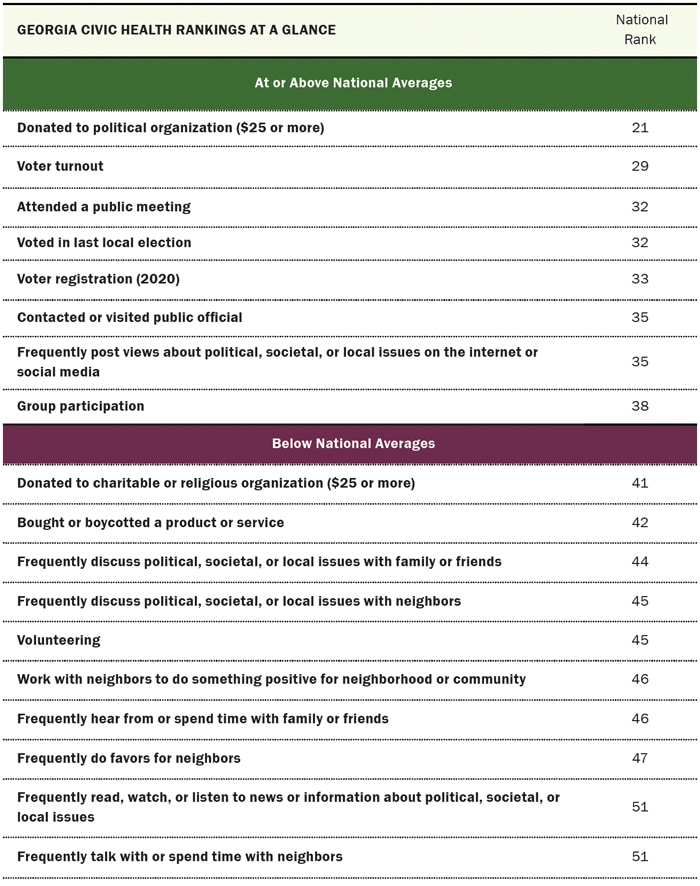
Welcome to the third edition of the Georgia Civic Health Index.
The Georgia Civic Health Index (CHI) seeks to answer the question:
“How do Georgians participate in civic life and what does it mean for Georgia?”
What is Civic Health?
Civic health is the way communities are organized to define and address public problems. Civic health includes a wide range of civic engagement indicators, from social interactions among friends and family to the ways people participate in groups and communities. Civic health also reflects the ways people express themselves politically—in traditional measures like voter registration and turnout—as well as in social measures like discussing politics and sharing information.
Is Georgia Civically Healthy?
Georgia’s civic health is still not strong, according to the second edition of the Georgia Civic Health Index (CHI), released by Georgia Family Connection Partnership (GaFCP), the Georgia Municipal Association (GMA), and the National Conference on Citizenship (NCoC).
Civic health in the Peach state has declined in most of the 21 civic engagement measures that examine the way Georgians interact with each other, their communities, and in political life since the first report was published in 2013.
While Georgians who are older, more educated, or have higher incomes exhibit better rates of civic engagement, Georgia on the whole exhibits some of the lowest rates of civic engagement in the nation. Georgia is about average for many social connectedness indicators, but is below average for most indicators of community involvement, political action, and confidence in institutions.
Why This Matters
Research has linked civic health to:
- economic resilience;
- workforce development;
- child development, adolescent well-being, mental health, and other public health outcomes;
- access to opportunity;
- community vitality;
- lower violent crime rates and youth delinquency; and
- reduced mortality.
2023 Georgia Civic Health Index
While data show an increase in voting rates from 2017 to 2021, measures of Georgians’ social connectedness and community involvement declined.
Regularly checking outcome measures over time allows physicians to identify whether their patients’ conditions are improving or deteriorating, and detecting changes in their health status informs treatment decisions. Maintaining—and improving—civic health requires the same strategy.
Georgia continues to struggle with its civic health, lagging the national averages across most measures, according to the third edition of the Georgia Civic Health Index (CHI), released today by Georgia Family Connection Partnership (GaFCP), the Georgia Municipal Association (GMA), Georgia City Solutions, and the National Conference on Citizenship (NCoC).
“In Georgia and across the country, the data reveal that despite the devastating impact of the COVID-19 pandemic, citizens continued to serve each other and their communities—giving their time and talent to help others at a time of unprecedented need,” said NCoC Research and Evaluation Director Jeff Coates. “But more needs to be done to increase political and voter engagement rates in the state and the nation.”
The report examines civic engagement measures and explores the way Georgians interact with each other, their communities, and in political life under four main areas of civic health: social connectedness, community involvement, political action, and confidence in institutions.
Georgia’s national ranking has dropped in several measures since the second edition of the report was published in 2019, including:
- frequently posting views about political, societal, or local issues on the internet or social media—13th to 35th,
- frequently discussing political, societal, or local issues with family or friends—33rd to 44th, and
- frequently volunteering—44th to 50th.
Georgia ranks lowest in the nation—51st—in frequently talking with or spending time with neighbors and frequently reading, watching, or listening to news or information about political, societal, or local issues. Beyond that, only 7.7% of Georgians reported they frequently do favors for neighbors compared to 10% nationally.
Research has linked strong civic health to other positive community outcomes, including economic resilience, workforce development, access to opportunity, lower violent crime rates, and community vitality, as well as other public health outcomes, including child development, adolescent well-being, mental health, and reduced mortality.
“Vibrant, economically prosperous cities form the bedrock of a thriving state,” said Georgia City Solutions Chair Kirby Thompson. “Cultivating our civic health directly influences the well-being of our communities and their residents. It is crucial for us to understand the interplay between civic health and the long-term prosperity of our communities.”
The good news is that Georgia measures on par or better than the rest of the nation in eight indicators, which suggests promising opportunities for our state.
More Georgians are Voting, Contacting Public Officials, and Attending Public Meetings
More Georgians are voting. While Georgia ranked 37th in the nation for voter registration and voting in the 2019 edition of the CHI, our state ranks 33rd in voter registration and 29th in voting in the 2023 report. However, the report revealed that voter turnout increased significantly with age. And though our national ranking improved, the percent of registered voters increased only slightly from 69.4% in 2017 to 70.7% in 2021.
Georgia also saw a significant improvement in another measure of political action, ranking 35th in the nation in contacting public officials—up from 49th in the 2019 CHI. Communicating with public officials is another critical step in ensuring that a community’s interests are represented in decision-making. However, the likelihood of Georgians contacting a public official generally increases with age, more education, and higher income levels.
Similarly, 8.2% of Georgia’s residents report attending a public meeting, which ranks our state 32nd in the nation. Attending public meetings provides an opportunity to engage with fellow residents, and to share ideas and feedback with various public entities. Overall, attending public meetings also tends to increase with age and income.
Embedding Strategies to Improve Civic Participation
“The strength of our democracy begins in our cities and local communities, where common good emerges after the hard work of engagement and consensus building is complete,” said GMA CEO and Executive Director Larry Hanson. “Community engagement and action—voting, attending public meetings, and engaging in civic-focused activities and respectful dialogue—is vital for creating the places where we want to live, work, and play. As this report shows, the challenge of fostering meaningful civic engagement and connectivity remains a worthy and necessary goal.”
Georgia ranks 38th in group participation—a significant increase from the 2019 report when Georgia ranked 49th. This matters because group participation harnesses the collective power of individuals working together toward a common goal, allowing groups to pool their resources, skills, and efforts to address community priorities and bring about meaningful change. As with other indicators, group participation increases with age, income, and education.
A growing number of evidence-based and evidence-informed practices that communities can develop and implement to improve civic health include:
- providing instruction in government, history, law, and democracy using evidence-based curricula like iCivics;
- modifying built environments to increase opportunities for face-to-face interactions across generations and among various community populations; and
- promoting digital literacy and equity, a condition in which all individuals and communities have the information technology capacity they need to fully participate in our society, democracy, and economy.
Critical partners like GMA, Georgia City Solutions, the Georgia Center for Civic Engagement, and local Family Connection Collaboratives across the state are embedding strategies to improve civic knowledge and participation—informed by 10 years of data—in all 159 counties across the state.
“Gathering data is vital, but it’s not enough to equip all Georgians to fully participate in a democratic society,” said GaFCP Executive Director Gaye Smith. “While we still struggle to overcome our civic health issues in Georgia, we’re taking a collaborative approach that brings community members together, because that is the core component of fostering social connectedness, community involvement, and political action—and advancing improvements to our state’s civic health.”

Download the 2023 Georgia Civic Health Index.
